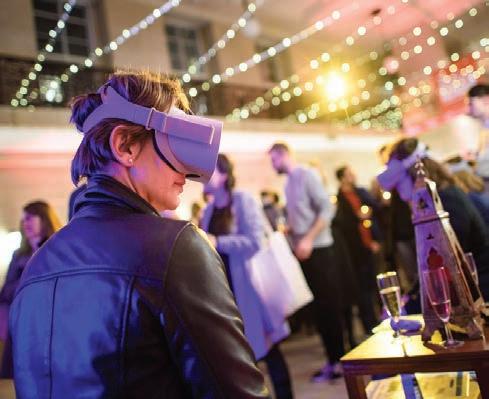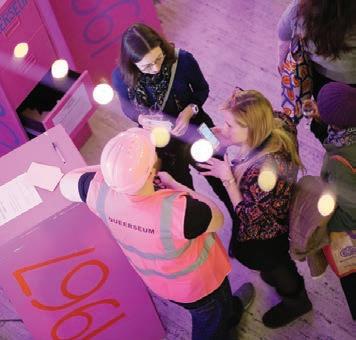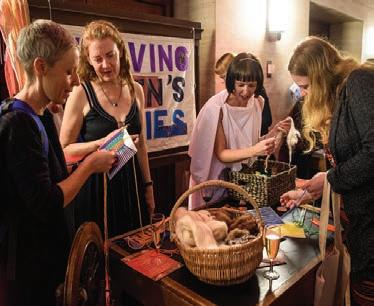
5 minute read
Being Human in a New World
By Dr Michael Eades
Every festival offers an opportunity to glimpse an alternative world. Normal rules are suspended. Conventions are relaxed. Different ways of living and working seem possible. Festivals are places where alternative worlds come, briefly, in to being. They help us imagine how things might be different.

Our theme for this year’s Being Human festival is ‘New Worlds’. It could hardly be more topical. When we decided this theme for the UK’s national festival of the humanities, we had a few things in mind. We were thinking of the ‘New World’ that the UK was entering on leaving the EU. We were thinking of the turn of the decade and all of the hope and nostalgia that it brings. We were thinking of the anniversary of the Mayflower sailing to the ‘New World’ in 1620.
But of course our theme has a different resonance now. The COVID-19 crisis has swept the globe, taking the old world with it. As the crisis continues, more and more people have begun to say that, come what may, the world cannot simply ‘return to normal’ when it passes. Too many problems have been exposed. Too many possibilities have been glimpsed. Now more than ever, we need big ideas. We need the humanities: the subjects that help us to understand what it means to be human.
Being Human in 2020
Being Human festival takes place every November in venues across the UK. Run by the University of London’s School of Advanced Study, in partnership with the Arts and Humanities Research Council and the British Academy, it is the only nationwide festival in the world that celebrates the humanities and humanities research. We exist to take new ideas in subjects from Art History to Philosophy, Literature to Languages, Classics to Cultural Studies, and make them as accessible and relevant to as many people as possible.
This year, events will be taking place across the country between 12–22 November. The team have worked hard to make sure not only that the festival goes ahead, but that we can deliver a festival that is safe and socially-distanced, blending small face-to-face events with online activities. Having more online means that for the first time people will be able to tune in from around the world. The only limit is choosing which of the many activities to join!
We have festival ‘Hubs’ in four cities across the UK: Glasgow in Scotland, Swansea in Wales, with Derby and Sheffield acting as our English Hubs. Beyond this, we have activities large and small popping up in over 40 towns and cities across the country – with events also happening in Paris and other cities internationally.

Programme highlights
Our programme reflects some of the key issues of the year so far. The festival will be launched by Professor David Olusoga, whose work on Black British History and de-colonisation has shaped so much of the debate as Black Lives Matter protests grew around the world. Another of our patrons, Bonnie Greer, will feature in the programme too, in conversation with our Festival Director, Professor Sarah Churchwell just four days after the US election. They will be unpicking the role that race, Black Lives Matter and national identity will play in one of the major political events of the year.
The University of London federation is playing a leading role in the programme. Goldsmiths, University of London are taking over a repair shop in New Cross, where they’ll be running workshops on waste, recycling and sustainability. Queen Mary University of London are organising sensory workshops exploring the history of migration in the East End. Senate House Library will be delving into their Terry Pratchett archives to explore the fantastical worlds of one of Britain’s best-loved writers, whilst the University of London Institute in Paris will be coordinating book-binding workshops with refugee groups in Paris. Activities are also being organised by other Member Institutions, including the Royal Central School of Speech and Drama, UCL, LSE, King’s College London, SOAS and the Courtauld Institute of Art.
Coming together for the humanities
Outside London, our national programme also reflects current events. From museums exploring ways to de-colonise their collections, to events exploring our relationship with nature and the importance of open spaces, to activities exploring the lost industries of ‘left behind’ corners of the country, the festival will respond to the key concerns of 2020 in creative ways. We have a feminist rap battle based on ancient Mesopotamian texts and we have an opportunity to play a game of feminist Cluedo. We have nature walks and socially-distanced dance performances. We have activities in care homes, where residents will receive hand-delivered activity packs to enable them to take part.
This year we are also introducing a new series of events, ‘Being Human Cafés’. Based around the notion that even the most complicated research can be explained in the time it takes to have a cup of tea or coffee, our Cafés will be popping up at a grassroots level right across the country. Some will be in actual cafés, others will be online. What they will all have in common is that they will offer people an opportunity to come together, have a chat, and learn something new and inspiring about humanities research.
See you in November
This is just a tiny selection of what we have planned this year. There will be much, much more popping up across the University of London, across the UK and (digitally) across the world. 2020 has turned out to be a different type of ‘New World’ to the one that we’d imagined, but one thing is clear: it is a world that needs the humanities more than ever.
The Being Human festival runs from 12-22 November 2020. To explore the festival programme visit: beinghumanfestival.org Follow the festival on Twitter and Instagram @BeingHumanfest
Dr Michael Eades is curator and manager of the Being Human festival.











